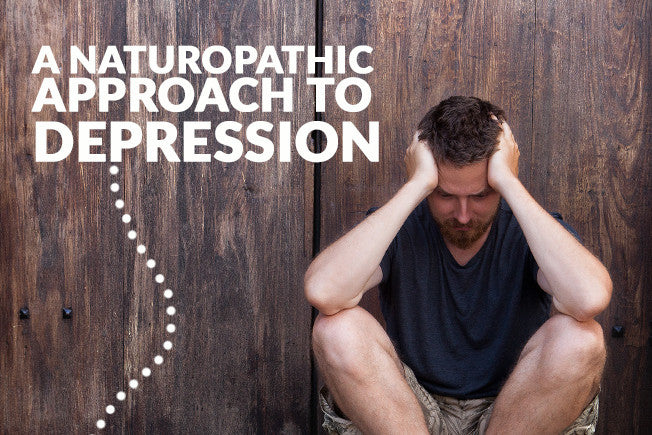
Loading..
My Store
Hours of Operation
Find your nearest store
Results
Loading...

We all have days when we don't feel like doing much. We might be tired, sad, or feel lonely. But how do you know when you have depression? And what can you do to naturally treat it? Naturopathic doctor Stephanie Cordes has the answers in this guest blog post! And don't forget to Sign Up to get great content to your inbox!
According to the Canadian Mental Health Association, 8% of Canadians will suffer from a major depressive disorder (MDD) in their lifetime. That percentage may in reality be much higher, as stigma and a lack of public awareness of mental health prevents a lot of people from recognizing the state of their mental well being and getting the support that they may need.
Diagnostic Criteria for Major Depressive Disorder (DSM-V):
All of us have days when it seems like things just aren’t working out; days when life in general becomes exhausting and overwhelming. It’s when our low mood causes significant distress and/or negatively effects the individual’s occupation, relationships, or other areas of daily functioning that it becomes depression, or MDD.
According to data collected by Statistics Canada between 2007 and 2011, as many as 17% of women and 8% of men between the ages of 45 and 64 use antidepressant therapy. Antidepressants can improve quality of life and in some cases even save lives. However, psychoactive pharmaceuticals come with side effects that can be extremely uncomfortable and don’t work for everyone. Whether or not you use antidepressants as a therapy there are complementary therapies available that can be used to improve the efficacy of medication, help with the side effects, or be used as a stand-alone treatment. Depending on things that come to light via an in-depth health history, focused physical exam, and lab work if appropriate, a naturopathic doctor may suggest a few of the following items depending on your situation:
EAT
REST
HERBS
Many medicinal plants are used for low mood, including oat straw, lemon balm, and saffron. Some herbs interact with one another, interfere with medication, or cause dangerous side effects so it’s advisable to use herbs under the supervision of a licensed practitioner. St John’s Wort, a commonly used herb for mild to moderate depression, is known to interact with a large variety pharmaceuticals and can even cause an emergency condition called “serotonin syndrome” when taken with certain antidepressants. Just because it’s natural doesn’t mean it’s safe when used in combination with other medications.
SUPPLEMENTS
Many supplements are used successfully for mood. Vitamin D is commonly suggested for depression, as we get very low levels of sun exposure here in the northern hemisphere (especially in winter). Vitamin B12 and folic acid can benefit mood and energy if levels are not within the ideal range. Exercise caution with supplements, as they too have potential side effects and interactions. 5-HTP, another popular supplement for depression, can be extremely dangerous when used in combination with psychopharmaceuticals.
ACUPUNCTURE
Needling can provide relief from depression as well as some of the issues that commonly appear alongside depression, such as chronic pain, insomnia, hormone imbalances, low energy and irritability. Community acupuncture has the added benefit of interrupting the isolation of depression by zoning out with needles in a quiet, comforting and safe community space.
MANAGE THE STRESS
Perceived levels of stress have a huge impact on our health and our moods, so stress management is very beneficial to our short and long-term well-being. Some suggestions include:Due to the overwhelming nature of depression, simple suggestions can be disempowering, making us feel helpless. If you are ready to make some changes you may want to add one therapy or lifestyle modification at a time, waiting until it becomes an easy routine before adding in another. What works for others may not work for you, so try to allow the space for mistakes and self-forgiveness. Remember: this mood will not be the same forever: the only thing that is constant is change.
If your mood ever becomes unbearable, you find yourself having suicidal thoughts or engaging in self-harm, or you meet the criteria for MDD, please don’t wait to seek professional help. There’s a wide range of available therapies for mood that are worth trying. Life can get easier.
Sign up for our Newsletter for product deals and more great health tips!
PLEASE NOTE: ALL MATERIAL AND INFORMATION CONTAINED IN THIS POST IS FOR EDUCATIONAL PURPOSES ONLY AND DOES NOT MEAN TO REPLACE OR AUGMENT ANY ADVICE OR CONSULTATION PROVIDED BY A LICENSED HEALTH CARE PRACTITIONER OR PHYSICIAN.
ABOUT THE AUTHOR
Dr. Stephanie Cordes, ND has a special interest in mental wellness, pain, and digestive health. Health education and increasing the accessibility of complementary healthcare has been a longtime passion and she has built a practice that recognizes structural violence as a major player when it comes to human health. As a result she focuses on empowering the individual by delivering trauma informed care, offering insight about health conditions and current health research, and involving people in the own private practice in Guelph or poking people at Guelph Community Acupuncture. For more information visit www.drcordes.com, send an email to info@drcordes.com, or call 519-835-5215.{"one"=>"Select 2 or 3 items to compare", "other"=>"{{ count }} of 3 items selected"}
Leave a comment